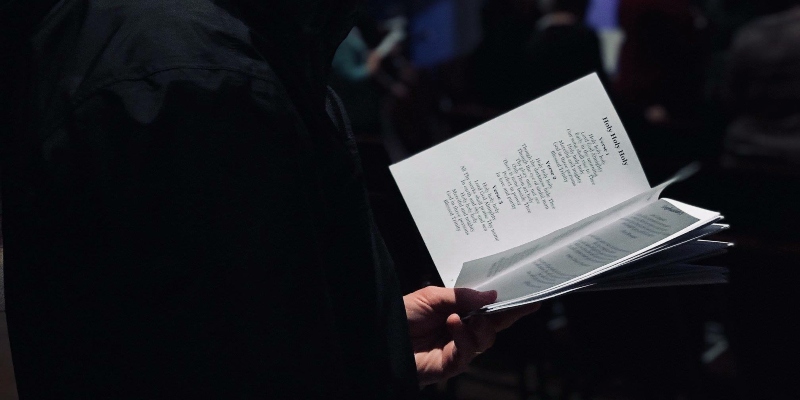A blessing in disguise?
With congregational singing not allowed for the foreseeable future, Colin Sedgwick has a suggestion that could lead to a deeper understanding of our psalms, hymns and spiritual songs

So… churches everywhere are starting to think about meeting together again as the lockdown eases. Everyone recognises that this has to be a very careful and cautious process. And one thing that seems quite clear is… no singing.
We might very well respond, “But I just can’t imagine coming together for worship without some form of music and singing! It’s something the church has done from the earliest days, and of course it’s right there in the Old Testament too."
True enough, but if that’s the way it has to be, well, so be it. The church, over two thousand years, has come through far worse problems than that, so we mustn’t doubt that we will come through this too.
I wonder too, though, if this might actually be something we can benefit from.
Already churches are reporting unexpected blessings and opportunities that lockdown has brought, like visitors “turning up” at virtual services; so why not also in this matter of services without song?
My thought (nothing particularly revolutionary) is this. If we can’t for the time being sing our songs and hymns, why don’t we read them? The reason this might be a blessing in disguise is that very often when we sing, I suspect that we fail to take any serious notice of the words. Because we’re enjoying the tune and being carried along by the music, the words just float over our heads.
Long before lockdown I have often felt that this is a serious fault of many of us. The church has inherited a truly wonderful treasury of “psalms, hymns and spiritual songs” (as Paul calls them), but they are simply wasted on us. All right, a lot of worship material, both old and new, is pretty mediocre, to put it mildly; but boy there’s some good stuff there as well! Yet we fail to benefit from it – like people wandering around an art gallery and admiring the wall-paper instead of the paintings.
There’s a hymn we sing quite often at our church which contains the lines “I dare not trust the sweetest frame,/ But wholly lean on Jesus' name.”
Walking home after the service in pre-pandemic days my wife and I sometimes wondered what this “sweetest frame” was that we “dare nor trust”. Not a window-frame, presumably. A frame of mind, perhaps? That also seemed rather unlikely. Reading the rest of the hymn suggests that it’s a frame in the sense of something that offers you support, something you can lean on. Yes, that must be it. But it isn’t exactly obvious, is it?
We decided to do what you might call a bit of consumer research, and ask some of our fellow-worshippers what they understood by it. And each time there was a blank look and, “Oh, I must admit I’d never really noticed that word… Yes, what does it mean?” Yet they had sung it many times.
I’m not criticising the hymn, of course. It’s a good hymn, though given that in its original form it’s nearly two hundred years old (written in 1836 by a Baptist minister called Edward Mote) it’s not surprising if it’s dated a bit.
No. The point is that our little experiment confirmed my suspicion: that very often we sing mindlessly - and therefore really might as well not bother.
Here’s my suggestion, then. Why not reduce the number of songs and hymns we include in our services, but focus on just three or four which we read out loud? (Given current guidelines this is most safely done with one hymn reader for the service from the front, rather than sharing the responsibility too widely.)
And then the musicians could play the tune while everyone “sings” the words internally, perhaps quietly humming along (lips clamped tightly together, of course).
That leads to another thought… Opera isn’t really my thing, but I do know one specially magical tune from Madame Butterfly by Giacomo Puccini. It’s known as “The Humming Chorus” because – well, I think you can probably guess. And it sounds wonderful. Mightn’t a similar thing add a whole new dimension to the way we worship? – assuming, as I say, that we have the words in front of us and are “singing” them in our minds and hearts.
Whether that’s a worthwhile suggestion or not, I’ll leave you to decide. But the vital point remains… Let’s value our “psalms, hymns and spiritual songs” and not just take them for granted. Let’s honour those who wrote them in the past, and let’s pray for those who are writing them today. We’d be in a bad way without them!
And when the time eventually comes that we can again sing whole-heartedly, hopefully we might do so with a richer, deeper understanding.
Father, thank you for the gift of music and for the vital place singing has in our worship. Thank you too for the rich heritage of psalms, hymns and spiritual songs that has been passed on to us from centuries gone by. And thank you especially for those whom you have gifted in producing such worship material today. Please help us to value it, and to make good use of it. Amen.
Colin Sedgwick is a Baptist minister with many years’ experience in the ministry.
He is also a freelance journalist, and has written for The Independent, The Guardian, The Times, and various Christian publications. He blogs at sedgonline.wordpress.com
Image | Tyler Callahan | Unsplash
Do you have a view? Share your thoughts via our letters' page.
Baptist Times, 29/07/2020